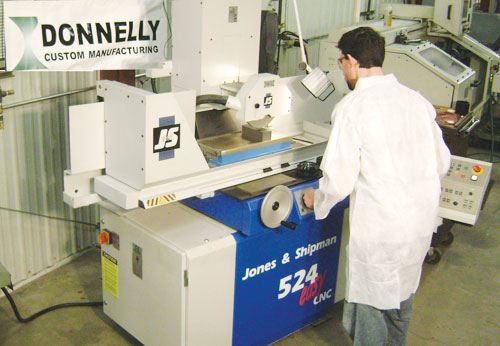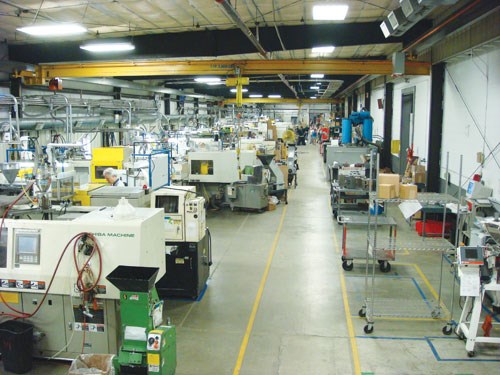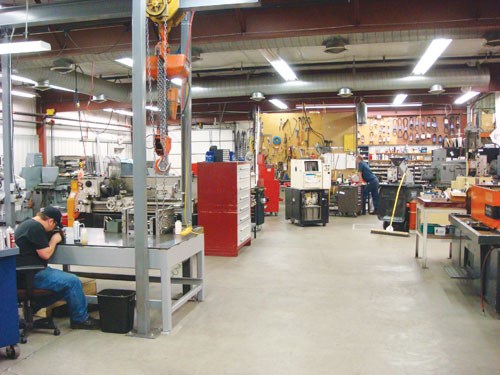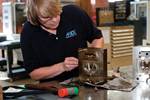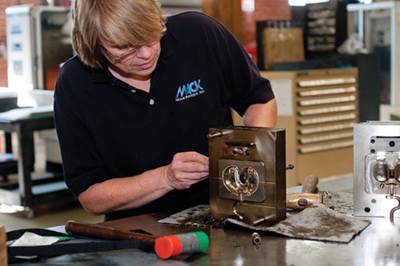Communication and Creativity Paramount in Tooling Supplier/Molder Relationship
This custom molder looks for creativity, reliability and a proven track record before it hires a tooling supplier.
Custom injection molder Donnelly Custom Manufacturing (Alexandria, MN) has been in business since 1984, with a focus on short-run manufacturing—a process the company has built upon and fine-tuned over the years to emerge as a leader in short-run with OEM customers like Diebold, Graco, Donaldson and Scotsman. A vital part of its work is cultivating strong relationships with its tooling suppliers.
“Specializing in short-run manufacturing allows us to overcome the challenges that are inherent to short-run manufacturing—compressed leadtimes, fast change-overs and the demands of Just-In-Time (JIT) inventory management,” notes President Ron Kirscht. “We understand that every part supports our customers' success. We believe we have set the standards for how short run is done. Our practices provide our OEM customers with value-added engineering and highly customized manufacturing and customer support services.”
Donnelly believes communication and creativity are paramount to its relationships with both its OEM customers and its tooling suppliers. Donnelly works closely with both its customers and suppliers to ensure that its short-run manufacturing niche will not be compromised.
Building Relationships
“We don't see short-run business as simply a point-of-entry into new relationships,” Jim McCarthy, Vice President, Director of Engineering Services, states. “We seek out this business—and focus on building enduring relationships with customers who have a multitude of short-run parts in their product lines. Our OEM customers understand basic part design and are able to conceptualize a part and start the design process. Our project engineers work directly with our customers’ designers to refine the part design to ensure it is moldable. In most cases, this is challenging because the designers generally push the envelope in terms of what can be manufactured. Because they select and involve us early in the process we are able to fully commit our resources to achieve maximum success—a functional design that supports key criteria in terms of appearance, functionality, cost and timing to market.”
In some cases, Donnelly will do a preliminary mold design and involve the potential tooling supplier in the design process. Much like the company has fine-tuned its short-run standards over the years; its tooling supplier selection process has also evolved. “In the early years we worked primarily with suppliers that were in close proximity to our business,” McCarthy recalls. “Now we maintain a listing of about 10 approved suppliers. These suppliers have been qualified for their core competencies and their ability to bring value-added solutions and unique expertise to the table.
When it comes to approving a potential tooling supplier, Donnelly Custom Manufacturing visits the moldmaker in order to understand the company’s business proposition and confirm capabilities, notes McCarthy. “We make sure we understand what they do best and where they can best serve our OEM customers’ needs,” he affirms. “We ask them about their business and learn their critical success factors and how they measure them.”
If Donnelly believes the moldmaker has the capabilities to be added to its approved list, they will put the potential vendor through the quoting process to benchmark the moldmaker against its existing supply base. “While price is always important, it is never the sole determining factor,” he states. “If everything is a go, we will add them as a conditional supplier for a period of six months to a year—depending on activity levels which determines the number of opportunities they will have to confirm a long-term fit.”
Customer service is very important to Donnelly. The molder expects calls to be returned promptly, timelines to be managed effectively, and any potential challenges to be dealt with quickly. “Price and leadtimes are important, but so is the ability to meet commitments and to deal with situations where things do not go smoothly or according to plan—because ultimately that is the greatest measure of people and companies,” McCarthy maintains.
Donnelly has also established and documented mold standards they supply to their approved suppliers. This serves as the road map to the mold construction process and dovetails with the specific needs of short-run manufacturing. As our customers choose us early in the process, we choose our mold supplier early.
“Ultimately the responsibility for the output falls on us, so we are motivated to ensure a robust design that is capable day in and day out,” McCarthy continues. “We make sure that we match up the core competencies of our moldmaker with the part design and don’t just quote folks that have no chance of getting the work. Most of our suppliers have worked with us for many years and we feel comfortable with their quality-for-price proposition. Over the years we have been required to establish suppliers in Asia; so we hold them to the same standards and they have performed well.”
Donnelly wants tooling suppliers to provide the company with the best solutions at a fair price. “We need creativity and solutions to accommodate the design process,” he says. “Very often, we obtain a quote from only one supplier that we know is uniquely qualified and capable for the project under consideration. We need a reliable, proven supplier to be responsible for the work at hand. Our customers are trying to collapse the leadtimes for new product introduction and very often they look at the mold build process as the last resort. Therefore, we expect our mold builders to always be looking for opportunities to reduce leadtimes—using tools such as lean manufacturing, 24-hour schedules on constraining and capital intensive equipment and concurrent engineering.”
Conquering Challenges
One of Donnelly’s biggest challenges is incorporating as many features in a part as possible. Its OEM customers want to minimize the number of individual parts (and thus molds) required in a project, which results in the need to incorporate as many features as possible in each part and the overall design. “The complexity of the molds obviously increases and the best design can become much more difficult,” McCarthy notes. “We seek to work with suppliers that provide creative—yet practical—solutions in order to achieve the desired result. The complexity equation has definitely accelerated and we need to be sure we produce and deliver a mold that can perform repeatedly and reliably in manufacturing.
“Our commitment is to continue to set new standards for short-run manufacturing, as evidenced by our willingness to abandon traditional assumptions and embrace change,” McCarthy adds. These high standards for excellence also apply to Donnelly’s relationship with its tooling supplier.
For More Information:
Donnelly Custom Manufacturing / (320) 762-2396
donnmfg.com
Related Content
Dynamic Tool Corporation – Creating the Team to Move Moldmaking Into the Future
For 40+ years, Dynamic Tool Corp. has offered precision tooling, emphasizing education, mentoring and innovation. The company is committed to excellence, integrity, safety and customer service, as well as inspiring growth and quality in manufacturing.
Read MoreHands-on Workshop Teaches Mold Maintenance Process
Intensive workshop teaches the process of mold maintenance to help put an end to the firefighting culture of many toolrooms.
Read MoreConfronting the Mold Design Talent Drought
Recently, I reposted on LinkedIn the results of an informal survey we conducted, which revealed a shortage of skilled mold designers. It quickly gained a lot of traction. Given the response, I thought I'd summarize the feedback and keep the conversation going.
Read MoreWhat is Driving Mold Lifecycle Management Digitalization?
OEMs are looking to partner with suppliers to share and track data across the supply chain for advanced intervention and process management.
Read MoreRead Next
Achieving High Value Customer Relationships
Mack Molding details how it cultivates relationships with its mold manufacturers and how these collaborations better serve its OEM customers.
Read MoreHow to Use Strategic Planning Tools, Data to Manage the Human Side of Business
Q&A with Marion Wells, MMT EAB member and founder of Human Asset Management.
Read MoreAre You a Moldmaker Considering 3D Printing? Consider the 3D Printing Workshop at NPE2024
Presentations will cover 3D printing for mold tooling, material innovation, product development, bridge production and full-scale, high-volume additive manufacturing.
Read More
